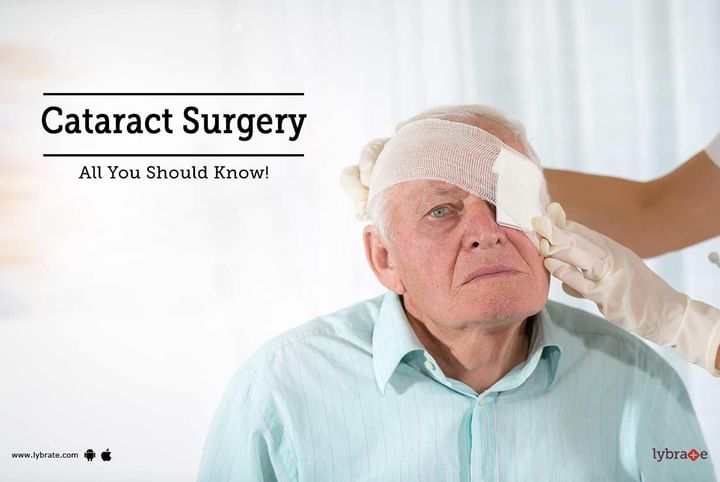Cataract Surgery - All You Should Know!
A cataract is defined as a clouding of lens in the eye where your vision gets blurred. A cataract affects the eyes, when light that passes through the lens prevents a clearly formed image from reaching your retina. The disease is very common and usually, develops as your eyes age or due to any injury caused to the tissues that cover your eye's lens.
Types of cataracts:
- Senile Cataract: This is the commonest of all. It is age-related clouding of the lens. It can affect the near or distance vision and can also cause glare and change in glasses power.
- Secondary Cataract: It can be developed after surgery for other eye problems like glaucoma and other health conditions such as diabetes.
- Traumatic Cataract: It can develop many years later after an injury caused to your eye.
- Congenital Cataract: As the term explains, the disease may be inborn or some children might develop it at a later stage which often affects both eyes.
- Radiation Cataract: It can form after you are exposed to some form of radiation.
A cataract surgery involves the extraction or cleaning of the cloudy lens, which is then replaced by a clear artificial lens.
Why does it happen?
There are lenses that lies behind our iris and pupil which act much like a camera lens. It helps concentrate light onto the retina at the back of our eye to form a sharply defined image. Besides, the lens also helps our eyes to adjust focus and allows us to see things clearly both far away and up close. The lens is composed of protein and water where the protein is arranged in a manner to keep the lens clear thereby letting light pass through it.
However, as we grow old, some of the protein starts to become thick and cloud a small lens area. This is known as a cataract. With the passage of time, it may inflate and cover more of the lens, making it difficult for us to see.
Besides, there are other causes of cataract such as smoking, addiction of alcohol, prolonged sunlight exposure, to name a few.
When should you opt for a cataract surgery?
Believe it or not, but till date no eye drop or medication has proven to reverse or prevent the formation of a cataract. If a cataract is affecting your nearsightednessor alteration in your prescription, then new prescription eyeglasses may help to better your blurred vision. However, the only treatment for a cataract is the surgical removal of your natural lens. And, most eye doctors recommend this surgery only when the problem becomes severe and starts hampering your day-to-day activities, such as studying or driving at night.
If you would like to consult with me privately, please click 'Consult'.
Cataract surgery is a procedure to remove the lens of your eye and, in most cases, replace it with an artificial lens. Normally, the lens of your eye is clear. A cataract causes the lens to become cloudy, which eventually affects your vision.
Cataract surgery is performed by an eye doctor (ophthalmologist) on an outpatient basis, which means you don't have to stay in the hospital after the surgery. Cataract surgery is very common and is generally a safe procedure.
How a cataract affects your vision
Cataract surgery is performed to treat cataracts. Cataracts can cause blurry vision and increase the glare from lights. If a cataract makes it difficult for you to carry out your normal activities, your doctor may suggest cataract surgery.
When a cataract interferes with the treatment of another eye problem, cataract surgery may be recommended. For example, doctors may recommend cataract surgery if a cataract makes it difficult for your eye doctor to examine the back of your eye to monitor or treat other eye problems such as age-related macular degeneration or diabetic retinopathy.
In most cases, waiting to have cataract surgery won't harm your eye, so you have time to consider your options. If your vision is still quite good, you may not need cataract surgery for many years, if ever.
When considering cataract surgery, keep these questions in mind:
- Can you see to safely do your job and to drive?
- Do you have problems reading or watching television?
- Is it difficult to cook, shop, do hardwork, climb stairs or take medications?
- Do vision problems affect your level of independence?
- Do bright lights make it more difficult to see?
Risks
Complications after cataract surgery are uncommon, and most can be treated successfully.
Cataract surgery risks include:
- Inflammation
- Infection
- Bleeding
- Swelling
- Drooping eyelid
- Dislocation of artificial lens
- Retinal detachment
- Glaucoma
- Secondary cataract
Loss of vision
Your risk of complications is greater if you have another eye disease or a serious medical condition. Occasionally, cataract surgery fails to improve vision because of underlying eye damage from other conditions, such as glaucoma or macular degeneration. If possible, it may be beneficial to evaluate and treat other eye problems before making the decision to have cataract surgery.



+1.svg)
